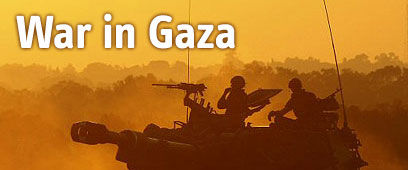

There is no doubt that Hizbullah leader Hassan Nasrallah is upset these days: Hamas is ruining his “spider web theory,” according to which Israel is a weak and indulgent country that would not dare hit its enemies too hard.
Today, no one can have any doubt about it: Israel proved to whoever needed this proof in the Middle East that Nasrallah’s spider web no longer exists. The Jewish State faced the “golden triangle” in the current war and was able to stand up to it: The home front is not crying out in the wake of rocket attacks, but rather, shows impressive endurance; civilian enemy casualties stir the global media yet do not hinder Israeli decision-makers; and finally, it appears we have been cured of the masochistic need for commissions of inquiry in the wake of wars.
There will no longer be anyone in the Arab world who can claim that Israel is weak and begging for its life, as was the case in the Hamas show depicting Gilad Shalit. The images of the past two weeks have been etched in the collective consciousness for years to come, while Hamas’ arrogance headed down to the trenches, along with the group’s frightened leaders.
The lesson has been learned, and now the time has come for the diplomatic struggle, which will be no less difficult than the military campaign. The IDF must deploy on the outskirts of Gaza Strip cities, tighten its pressure (while refraining from supplying the Palestinians with fuel,) continue its aerial assaults, and avoid contact with civilians, as the enemy will be attempting to exact casualties among our ranks via terror acts in order to tip the scales of victory.
Israel has won, yet the moment of victory could be the most dangerous in the entire campaign, as in the heat of success we may wish to keep on moving forward and get more, and in doing so lose everything. The moment where one stops remains etched in consciousness, and right now is this moment.
'Continue to exert maximal pressure'
We won, and now we must bear the fruit of success. How so? First, we should be wary of dangerous “mediators” such as Egypt and Turkey. In recent days, officials at the Prime Minister’s Office admitted that enlisting the help of Islamist Turkish leader Erdogan as a mediator vis-à-vis Syria was a “mistake.” We jeopardized immensely important interests vis-à-vis Turkey, as any Israeli disagreement would have immediately hurt this sensitive mediator.
We should not be using Egypt’s help on the Gaza front, as Cairo is an interested party in the affair. The Egyptians have a clear interest in seeing Gaza remain in our hands following the operation. Therefore, only a Security Council track and another resolution via the UN should be accepted by Israel, as was the case following the Second Lebanon War. The Americans and French can start working on such resolution.
It will be a struggle, and we should prepare for it. To that end, we should continue to exert maximal pressure on the Strip, yet do so without endangering our troops too much. What are Israel’s minimum demands, which we must not forego?
- The crossings between Israel and the Strip will become a border, and will no longer be opened, as the weakened Hamas will continue to rule Gaza, and Hamas is Israel’s enemy. Never in the history of the world had a state fed its enemies.
- The Rafah Crossing will from now on become Gaza’s connection to the Arab world, and Israel will leave the supervision work to Egypt. The Egyptians already realized the gravity of the damage Gaza can cause them.
- A force similar to UNIFIL, comprising at least 15,000 troops, will be deployed across the Strip, as is the case in southern Lebanon. This will be the world’s way of monitoring what goes on in this dangerous zone. This force will monitor the border crossings and ensure that no new tunnels are being dug.
- This force will have the mandate to engage in a phased demilitarization of the Strip and monitor Hamas’ future military build-up. Why should Hamas agree to it? Because it will remain the Gaza Strip’s ruler.
- An international demand for the unconditional return of Gilad Shalit, in order to eliminate the legitimacy of future abductions.
Just as Nasrallah learned the lesson and agreed to the international terms set forth two and a half years ago, the same may happen with Hamas, whose condition is much worse than its mentor’s condition was – meanwhile, Hizbullah watches on from the north, disappointed by its student’s performance.















